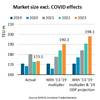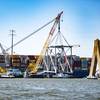Asian Jet Fuel Shipments to US West Coast Picking Up
Delayed restart of Exxon refinery draws down inventories. Valero and BP among traders shipping jet from Asia to U.S.
Asian jet fuel shipments to the United States West Coast region could pick up this month as a prolonged cut in throughput at a California refinery is drawing down inventories, traders said on Wednesday.
Arbitrage economics to ship jet fuel from North Asia to the U.S. West Coast are now profitable, so there would be an increase in spot jet fuel cargoes on that route over the coming weeks, they said.
Demand from the U.S. helped push up Asian jet fuel margins to a one-week high on Wednesday.
An explosion in February that shut the gasoline-making unit of Exxon Mobil's Torrance 149,500 barrels-per-day (bpd) refinery near Los Angeles reduced throughput at the refinery.
This has pushed up gasoline prices which is prompting refineries in the U.S. west coast to produce more gasoline than jet fuel, in turn drawing down inventories for the latter and increasing import demand, one of them said.
"The U.S. west coast prompt month market is strong and has been since middle of last week...I think the ExxonMobil incident and a delayed restart is causing it," a Singapore-based trader who is familiar with shipments on that route said.
The distillate stocks, which include jet fuel, in the U.S. west coast slipped by nearly 4 percent to 13.901 million barrels in the week to May 1, latest data from the U.S. Energy Information Administration showed.
Valero has tentatively fixed the "Qi Lin Zuo" to ship 60,000 tonnes of jet fuel from South Korea to the U.S. west coast for loading in late May, traders and shipbrokers said.
Marubeni has tentatively fixed the High Progress to ship 40,000 tonnes of jet fuel from either South Korea or Bristol Bay headed to the U.S. west coast, though this could not be confirmed.
At least two other cargoes are also due to be shipped from South Korea and Taiwan, including one by BP, they added.
When the arbitrage economics are not profitable, typically only 1 or 2 vessels are shipped on that route, traders said.
Shipments could slow once the firm demand starts driving up jet fuel prices in Asia, a Singapore-based jet fuel trader said.
"(Arbitrage economics) are well workable if you have cargo on the water, so it's more for the prompt dates," he said.
"If you buy the oil now and ship to the U.S., by the time the cargo arrives in the U.S., the arbitrage might shut."
Still, with demand for jet fuel weak in Asia and supply ample with refineries largely back from maintenance, it might be a matter of which trade flow loses the least money, a second trader said.
Reporting by Jessica Jaganathan













